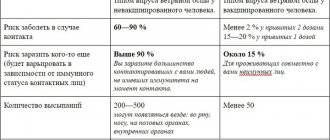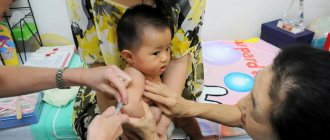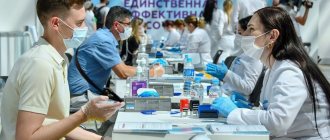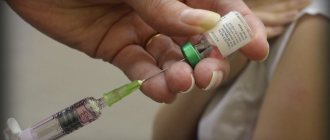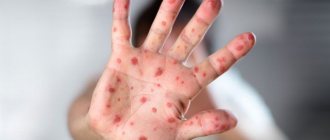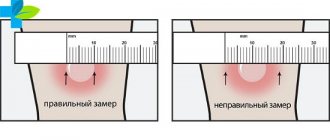→
Information
→
Vaccinal prevention
We work seven days a week and holidays
COVID 19: antibody tests
Preventive vaccinations help avoid the development of epidemics and also significantly reduce the risk of complications from the disease. For vaccination to be truly effective and safe, you should properly prepare for vaccination.
The safety of vaccination depends on the following factors:
- high-quality preparation for the procedure;
- choosing a suitable drug: sometimes it is better to supply an imported vaccine than a cheaper domestic analogue;
- vaccination conditions: it is better to give vaccinations in modern rooms equipped with equipment for anti-shock therapy; If negative reactions to the body occur, the vaccination office staff will be able to quickly provide assistance and refer you to the hospital for a more thorough examination.
When to start preparing for vaccination
Ideally, preparation for vaccination takes about two weeks. This period especially needs to be maintained before serious vaccinations, for example, DPT. If your immune system is weakened, chronic diseases often occur, or there is a high risk of an allergic reaction, it is advisable to visit an immunologist.
The child will need psychological preparation before vaccination. It is better to explain the purpose of the visit to the treatment room in advance; you can watch a themed cartoon or play a game with a similar plot.
What do you need to know before vaccination?
- Before vaccination, you must complete and sign “informed voluntary consent to medical intervention.” Without this document, no one has the right to vaccinate your child, either in a clinic, or in a kindergarten, or at school. Only mom or dad can sign such consent. Other family members - grandparents, uncles and aunts are not legal representatives.
- Before the procedure, it is necessary to undergo a doctor’s examination and assess the child’s well-being. He conducts a thorough survey to identify previous diseases, including chronic ones, allergic reactions to medications and dietary habits of the body. In rare cases, your doctor may order tests or recommend consultation with other specialists before vaccination.
- Ask your doctor about possible post-vaccination reactions. He will tell you what to expect. For example, an increase in temperature is a normal reaction of a healthy child’s body.
- Make sure that when carrying out vaccination, immunobiological drugs are used that are registered in accordance with Russian legislation. You must know for what and what kind of vaccine the child will be given. If in doubt, be sure to ask your doctor about everything.
- If more than one vaccination is carried out on one day, then they are placed in different parts of the body and each with a new syringe.
- If you missed the vaccination dates, you need to contact your pediatrician to set new dates.
- If you have a vaccination certificate, take it with you on the day of vaccination. An immunization certificate is a document that records all the vaccinations given to a child from the beginning of life. The doctor will add information about the new vaccination there. If it is being done for the first time or you have not obtained a certificate before, then simply ask the doctor to issue you such a certificate.
The certificate will be useful before entering kindergarten and school, as well as when changing your pediatrician or when traveling long distances.
Pay attention to nutrition
Two weeks before the scheduled vaccination, it is recommended to switch to a hypoallergenic diet: this will help the body tune in to productive work and respond correctly to the administered vaccine. Citrus fruits and honey, which themselves are strong allergens, should be excluded from the diet. Adults are advised to abstain from drinking alcohol for several days.
The child should limit the volume and reduce the concentration of food. For example, you can add less oil to your breakfast porridge and make it less rich. It is better to dilute the usual juices and compotes with water.
Another important point: vaccination should be done with an empty intestine. If necessary, you can take a laxative or give an enema.
What restrictions must be observed after vaccination?
Director of the Gamaleya Research Center, the developer of the Sputnik V drug, Academician of the Russian Academy of Sciences Alexander Gintsburg, explained that it is recommended not to drink alcohol at all for the first three days after the injection.
Then you just need to abstain from drinking too much alcohol
In addition, you should follow simple rules: on the first day, do not wet or rub the injection site, reduce physical activity for several days, do not get too cold or overheat, and also avoid foods that can provoke an allergic reaction, Rospotrebnadzor explained.
How to behave on the day of vaccination
On the day of vaccination, you should visit a therapist or pediatrician for a general examination. It would be a good idea to take a blood and urine test in advance.
Only a healthy person can be vaccinated. During illness, the body is weakened and it is more difficult for it to cope with the additional load in the form of the administered vaccine.
You can visit the vaccination office only after consultation with a specialist who will tell you about the composition and features of the vaccine, and also give recommendations on actions in case of possible complications.
Preparing a child for vaccination
To decide on the need for vaccination, determine which vaccine a child needs, the process of preparing for vaccination and monitoring after vaccination, you need to consult a doctor.
If you have a certificate of preventive vaccinations (a special book for recording vaccinations given to your child, the form of the certificate is approved by order of the Ministry of Health of the Russian Federation dated September 17, 1993 N220 “On measures to develop and improve the infectious diseases service in the Russian Federation “Certificate of preventive vaccinations, form No. 156/u-93), take it with you so that the doctor can enter information about the new vaccination there. If you have not been vaccinated before or do not have such a certificate, ask your doctor to issue one.
These records may be useful later to show that your child has the required vaccinations before entering kindergarten or school, or in case of a move or change of doctor.
Can I get vaccinated?
Indications and contraindications for vaccination are determined by the doctor.
Before immunization, the doctor (paramedic) conducts a thorough survey in order to identify previous diseases, including chronic ones, the presence of reactions or complications to the previous administration of the drug, allergic reactions to medications, products; identifies individual characteristics of the body (prematurity, birth trauma, convulsions), and clarifies whether there are contacts with infectious patients, as well as the timing of previous vaccinations.
Remember that in case of acute illnesses accompanied by fever (colds, sore throat, bronchitis, flu, pneumonia, etc.), vaccination, as a rule, will need to be postponed until recovery.
Does your child have a confirmed severe allergic reaction to anything?
If a child has allergic disorders, then the need for additional measures should be discussed with the attending physician in advance.
Remember that you should not introduce new types of food a few days before and in the first days after vaccination. If your baby is breastfed, do not include new foods in your diet.
Tests and additional permissions from doctors
Your healthcare provider may determine that tests or recommendations from other specialists may be needed before vaccination.
For example, if the pediatrician is unclear about the nature of changes in the nervous system, he can refer the child to a neurologist, after which he will decide on vaccination and the choice of vaccines.
On the day of vaccination
You have the right to obtain information from your doctor about the vaccine, the need for vaccination, possible reactions to vaccination and the consequences of refusing vaccination.
The doctor will ask you the questions mentioned in the previous section to determine if your child has any contraindications and if special precautions are needed for vaccination.
Don't be shy to ask your doctor questions. You can clarify, for example, what vaccine the child will be vaccinated with, when and what reactions may occur, and in what cases to seek medical help. In order not to forget all the questions to the doctor, you can use the BABY GUIDE application and include them there.
You should not scare your baby with injections and doctors. This can leave a negative imprint for life. If the child is already an adult, it is better to explain to him what the doctors will do, and most importantly, why. During the injection, you can hold the baby in your arms to prevent unexpected movements of the child. The health worker providing immunization should not restrain the child himself. You should not rush to leave the clinic; usually the doctor or nurse asks the parents to sit for about 30 minutes near the office. This will help calm your child and help him if he has any reactions to the vaccine.
Discuss with your doctor the use and dosage of a child's fever reducer, as well as symptoms that warrant calling your doctor.
After vaccination, you can also set the date of vaccination in the “Vaccination Calendar” section in the BABY GUIDE program.
Day after vaccination
Ask your doctor how you can bathe your child after vaccination.
Your doctor may recommend monitoring your baby’s body temperature in the first days after vaccination. Discuss with your doctor the use and dosage of a pediatric fever reducer, if necessary.
If you are concerned about how your child looks or behaves after vaccination, consult your doctor.
Show sources
Sources
What to do if you feel sick after vaccination?
Immediately after vaccination, you should remain under medical supervision for about half an hour in case of an allergic reaction, recalls Nikolai Briko. This is the most dangerous period, and the vaccination room has everything you need to stop a severe allergic reaction.
In general, most people tolerate the vaccine well, without any symptoms. Some people experience mild malaise, a slight short-term increase in temperature, and redness at the site of vaccine administration.
If your body temperature rises above 38 degrees, it is recommended to take an antipyretic, such as paracetamol.
What choice of vaccines do Russians have?
The first vaccine to be registered in Russia was Sputnik V, a vector vaccine based on adenovirus DNA with an integrated SARS-CoV-2 genome. The adenovirus works as a “container” for delivering the coronavirus gene into the body’s cells so that the immune system recognizes the genetically modified virus and begins to produce antibodies to it in order to protect itself when it encounters the real thing. The light version of Sputnik Light is the first dose of Sputnik V.
The second vaccine registered in our country was developed by Novosibirsk - this is a peptide vaccine with synthetically created antigens based on EpiVacCorona peptide antigens.
The third Russian vaccine, CoviVac, was developed and produced by the Federal Scientific Center for Research and Development of Immunobiological Preparations named after Chumakov. The drug uses an inactivated virus, that is, unable to reproduce, which can trigger the process of producing antibodies in the immune system, but cannot cause the disease itself. According to the developers of the CoviVac vaccine, it is the content of the whole inactivated virus, and not fragments of its genome, that should provide more complete and lasting immunity to the coronavirus, since it causes the body to produce a full set of antibodies - to all the proteins of the virus at once.
However, according to Ilya Yasny, Russians currently have no alternative to Sputnik. “There are no other vaccines with such an evidence base in the country. It is known about EpiVacCorona that it does not work at all, so it can simply not be considered, but nothing can be definitely said about CoviVac, because full-fledged studies have not yet been conducted,” the expert believes.
In November 2021, Deputy Director for Research at the Institute of Epidemiology of Rospotrebnadzor, Alexander Gorelov, said that the operational headquarters to combat coronavirus would do everything necessary to ensure that Russians could choose between Russian and imported vaccines.
By order of the Russian government, foreign drugs against coronavirus can be registered on an emergency basis five days after the drug is registered in the United States, the European Union, Canada and a number of other countries.
But the company itself must apply for emergency registration
While American manufacturers Pfizer vaguely say that they will consider the possibility of filing an application for registration, the creators of Moderna do not comment on this matter. Pharmaceutical experts interviewed by The Bell suggest that foreign vaccines will appear on the Russian market no earlier than in a year or two.
